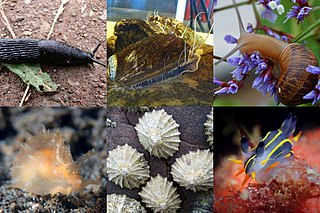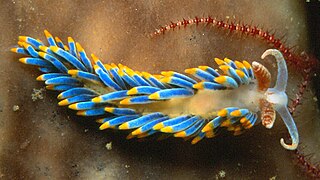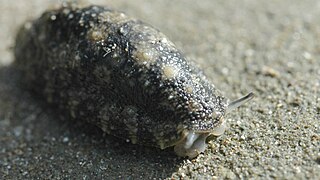
The gastropods, commonly known as slugs and snails, belong to a large taxonomic class of invertebrates within the phylum Mollusca called Gastropoda.

The Coral Sea is a marginal sea of the South Pacific off the northeast coast of Australia, and classified as an interim Australian bioregion. The Coral Sea extends 2,000 kilometres (1,200 mi) down the Australian northeast coast. Most of it is protected by the French Natural Park of the Coral Sea and the Australian Coral Sea Marine Park. The sea was the location for the Battle of the Coral Sea, a major confrontation during World War II between the navies of the Empire of Japan, and the United States and Australia.

Nudibranchs are a group of soft-bodied marine gastropod molluscs that shed their shells after their larval stage. They are noted for their often extraordinary colours and striking forms, and they have been given colourful nicknames to match, such as "clown", "marigold", "splendid", "dancer", "dragon", and "sea rabbit". Currently, about 3,000 valid species of nudibranchs are known.

Sea slug is a common name for some marine invertebrates with varying levels of resemblance to terrestrial slugs. Most creatures known as sea slugs are gastropods, i.e. they are sea snails that over evolutionary time have either completely lost their shells, or have seemingly lost their shells due to having a greatly reduced or internal shell. The name "sea slug" is most often applied to nudibranchs, as well as to a paraphyletic set of other marine gastropods without obvious shells.

Glaucus atlanticus is a species of small, blue sea slug, a pelagic (open-ocean) aeolid nudibranch, a shell-less gastropod mollusk in the family Glaucidae.

Onchidiidae are a family of small, air-breathing sea slugs. They are shell-less marine pulmonate gastropod molluscs. Onchidiidae is the only family within the superfamily Onchidioidea.

Peronia peronii is a species of air-breathing sea slug, a shell-less marine pulmonate gastropod mollusk in the family Onchidiidae.
Paraperonia gondwanae is a species of air-breathing sea slug, a shell-less marine pulmonate gastropod mollusk in the family Onchidiidae.
Paraperonia jousseaumei is a species of air-breathing sea slug, a shell-less marine pulmonate gastropod mollusk in the family Onchidiidae.
Paraperonia madagascariensis is a species of air-breathing sea slug, a shell-less marine pulmonate gastropod mollusk in the family Onchidiidae.
Peronia verruculata is a species of air-breathing sea slug, a shell-less marine pulmonate gastropod mollusk in the family Onchidiidae.
Peronia gaimardi is a species of air-breathing sea slug, a shell-less marine pulmonate gastropod mollusk in the family Onchidiidae.
Scaphis tonkinensis is a species of air-breathing sea slug, a shell-less marine pulmonate gastropod mollusk in the family Onchidiidae.
Paraperonia is a genus of air-breathing sea slugs, a shell-less marine pulmonate gastropod mollusks in the family Onchidiidae.
Peronia is a genus of air-breathing sea slugs, a shell-less marine pulmonate gastropod mollusks in the family Onchidiidae. These slugs differ from other onchidiid slugs in having branched "gills" on their dorsal side, although these can be retracted. More than two dozen species of Peronia have been described from the Indo-West Pacific, but a recent revision of the genus determined that 21 of these names are synonyms. Nine species of Peronia are recognized, most of which can differentiated only by examining their internal anatomy or with DNA sequencing.
Scaphis is a genus of air-breathing sea slugs, a shell-less marine pulmonate gastropod mollusks in the family Onchidiidae.

Richard "Slugger" Labbe is an American technical consultant who currently works for Toyota Racing Development. He had previously been employed in NASCAR as a crew chief for Yates Racing, Dale Earnhardt, Inc., Richard Petty Motorsports, Richard Childress Racing and others. He has also previously served as an analyst for NASCAR on NBC.
Semperoncis is a genus of air-breathing sea slugs, a shell-less marine pulmonate gastropod mollusks in the family Onchidiidae.
Pruvotfolia pselliotes is a species of sea slug, an aeolid nudibranch, a marine gastropod mollusc in the family Facelinidae.

Peronia platei is a species of slug, a marine gastropod mollusk in the family Onchidiidae, one of the families of sea slugs. Nine species of Peronia are recognized; the way to tell them apart is by DNA sequencing by mitochondrial and nuclear sequence or checking their internal anatomy. This species has hermaphroditic parts in the posterior regions of the deferent duct and straight oviduct. The male part is the muscular sac of the accessory penial gland in the anterior area. It is distributed across the entire tropical and subtropical Indo-West Pacific, from South Africa to Hawaii.








